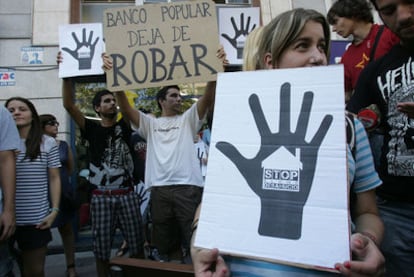Government's mortgage measures soothe, but don't heal
Latest changes will benefit families who can't keep up with home payments, but experts demand more ambitious reforms
"The government's measures are lowdown and deceitful because they do not include any help for families with mortgages." "The government will guarantee that the auction of a mortgaged property will lead neither to abusive situations nor to the mistreatment of the property."
The first sentence comes from a press release published on Friday by ADICAE, a Spanish consumers' association. The second is a quote by Deputy Prime Minister Alfredo Pérez Rubalcaba after last week's Cabinet meeting, where an initiative to help debtors who cannot pay their mortgage was approved.
Between both extremes, experts consulted believe that the government has moved a step forward, but they also argue that more measures are still needed if it intends to improve the situation of 94,000 families that last year experienced a foreclosure. This figure is four times larger than the one registered in 2007, at the beginning of the crisis. In Spain, mortgage holders are liable for the shortfall when the bank sells a home at a lower price than the original valuation.
The most important agreement reached on Friday by the executive consists of increasing the part of an individual's salary which cannot be seized under any circumstance, from 700 to 961 euros. Moreover, when a bank withholds a property because of non-payment, it will not be able to sell it for less than 60 percent of its appraisal value.
"I think the first decision is positive. It can help the owner to recover from insolvency in the medium term. The second, on the other hand, seems innocuous, because it maintains the most important part of the debt after auctioning the property," argues José María Marqués Villalonga, a lawyer. On this issue, he concurs with other experts who were consulted and who demanded that banks should not sell a property for less than 70 or 80 percent of its appraisal value.
It is important to point out that increasing the non-attachable income to 961 euros- which is 150 percent of the inter-professional minimum wage - does not mean that the bank has the right to keep the rest of the salary of someone whose property has been subject to a foreclosure. For instance, a mileurista (a term in Spain that describes someone who does not earn more than ¤1,000 a month) who has a mortgage can be sure that most of their salary will be safe, whereas the bank that expects to collect the debt of a person who earns 2,500 euros will hope to deduct between - 500 and 1,000 euros a month.
Marqués Villalonga, an insolvency expert, believes that the state should make sure that the money saved by citizens as a result of the increase of non-attachable income will not be withheld, as well as the interests generated from these amounts. "That decision leads us to the doctrine introduced in most of Europe and the United States, which aims to avoid concrete insolvency leading to social exclusion," the lawyer adds.
Whereas some consumers' associations believe that the governmental reforms are beneficial but insufficient, others such as ADICAE demand that embargos be paralyzed immediately. According to their figures, this would cost between 300 million and 500 million euros, "an amount the government can afford to take on board."

Tu suscripción se está usando en otro dispositivo
¿Quieres añadir otro usuario a tu suscripción?
Si continúas leyendo en este dispositivo, no se podrá leer en el otro.
FlechaTu suscripción se está usando en otro dispositivo y solo puedes acceder a EL PAÍS desde un dispositivo a la vez.
Si quieres compartir tu cuenta, cambia tu suscripción a la modalidad Premium, así podrás añadir otro usuario. Cada uno accederá con su propia cuenta de email, lo que os permitirá personalizar vuestra experiencia en EL PAÍS.
¿Tienes una suscripción de empresa? Accede aquí para contratar más cuentas.
En el caso de no saber quién está usando tu cuenta, te recomendamos cambiar tu contraseña aquí.
Si decides continuar compartiendo tu cuenta, este mensaje se mostrará en tu dispositivo y en el de la otra persona que está usando tu cuenta de forma indefinida, afectando a tu experiencia de lectura. Puedes consultar aquí los términos y condiciones de la suscripción digital.








































